The Boston Bruins will celebrate 100 years of hockey in 2023-24, honoring the players from past eras aiming to bring back as many familiar faces as possible for ceremonies throughout the season. As one of the league’s most respected franchises with a rich history of Hall of Fame skaters who produced some of the game’s most iconic moments, we dug through the record books to figure out who the leading scorer was every decade since the team debuted in 1924.
Cooney Weiland – 91 Points (1924 – 1930)
Cooney Weiland made his NHL debut at 24, joining the Bruins for the 1928-29 season when the franchise won their first Stanley Cup. Interestingly, he tallied just 18 points in 42 games that first year before exploding for a league-leading 73 points in 1929-30, giving him the most points for a Bruins player during their first decade in the league.
Eventually, Weiland would leave the Bruins in 1932, suiting up with the Ottawa Senators and Detroit Red Wings for four seasons before returning to Boston in 1936. Ultimately, the future Hall of Famer would retire in 1939 after winning a second championship, finishing with 335 career points, 238 of those points collected as a member of the Bruins.
Dit Clapper – 276 Points (1930 – 1940)
Dit Clapper is the only player in Bruins history to win three Stanley Cup championships with the team, hoisting the Silver Chalice in 1929, 1939, and 1941. Additionally, he is one of the longest-tenured skaters ever to wear the Spoked B, playing 835 games from 1927 to 1947.
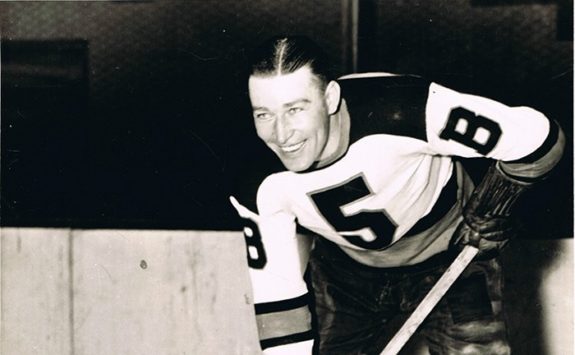
As one of the first superstars to play in Boston, Clapper led the team in scoring during the 1930s, finishing with 276 points in 459 games, which included a team-leading 143 goals. Even though he had 133 assists in the decade, he was five short of another Bruins legend, Eddie Shore, who had 138 helpers with 582 penalty minutes.
Bill Cowley – 361 Points (1940 – 1950)
Bill Cowley played 13 years in the NHL, earning enshrinement into the Hockey Hall of Fame thanks to two Stanley Cup titles with the Bruins in 1939 and 1941. Interestingly, he played with Boston from 1935 to 1947, skating for only seven years in the 1940s. However, in that short time frame, he managed to be the team’s best statistical player, leading all skaters in goals (128), assists (233), and points (361).
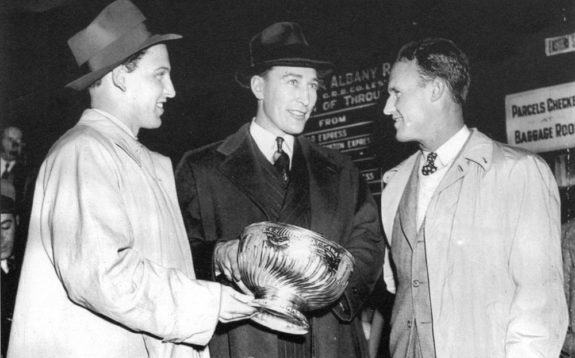
Although he had competition from other Boston legends, Milt Schmidt and Woody Dumart, Cowley was the team’s most dominant skater, leading the entire league in scoring with 64 points in 1941. Additionally, he won the first of his two Hart Trophies that season, finishing the decade with four All-Star selections and another Hart Trophy win in 1943.
Don McKenney – 325 Points (1950 – 1960)
Surprisingly, the Bruins lost in the Stanley Cup Final three times in the 1950s, with Don McKenney skating in two of those series in 1957 and 1958. After debuting with the club in 1954 as a 20-year-old, he would become the decade’s leading scorer with 133 goals, 192 assists, and 325 points.
Ultimately, his closest competition was Fleming MacKell, who kept each category to single digits except points, which he lost by 13. After nine seasons in Boston, McKenney left town in 1962, heading to the Toronto Maple Leafs, where he would win his only Stanley Cup title in 1964, eventually retiring in 1968.
Johnny Bucyk – 583 Points (1960 – 1970)
One of the most beloved Bruins of all time is “The Chief” Johnny Bucyk, who spent 21 years in Beantown and is still a frequent visitor to the Garden in his late 80s. During the 1960s, no one else dominated the scoresheet like Bucyk, who tallied a team-leading 240 goals, 343 assists, and 583 points.
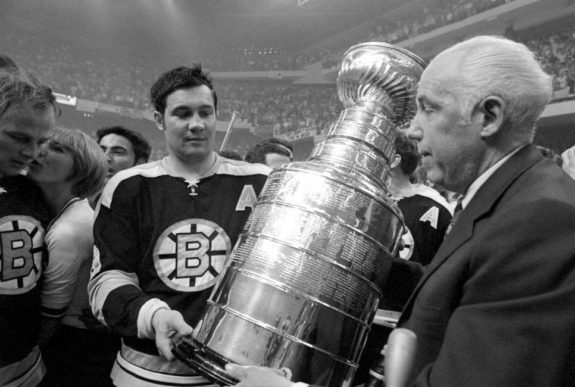
Eventually, the two-time Stanley Cup champion would become the Bruins’ best statistical player, taking over the games played, goals, assists, and points records upon retirement in 1978. Although most of his totals have been surpassed, he ranks second in several categories but remains the only skater in team history with over 500 goals, maintaining the goals record at 545.
Phil Esposito – 703 Points (1970 – 1980)
Although the discussion about the greatest player of all time usually comes down to “Mr. Hockey” Gordie Howe and “The Great One” Wayne Gretzky, no one ever talks about Phil Esposito, the first player in NHL history to score 100 points in a season. After reaching 126 points in 1968-69, he had an off year in 1969-70 with 99 points before setting the original modern-day record with 152 points in 1970-71.
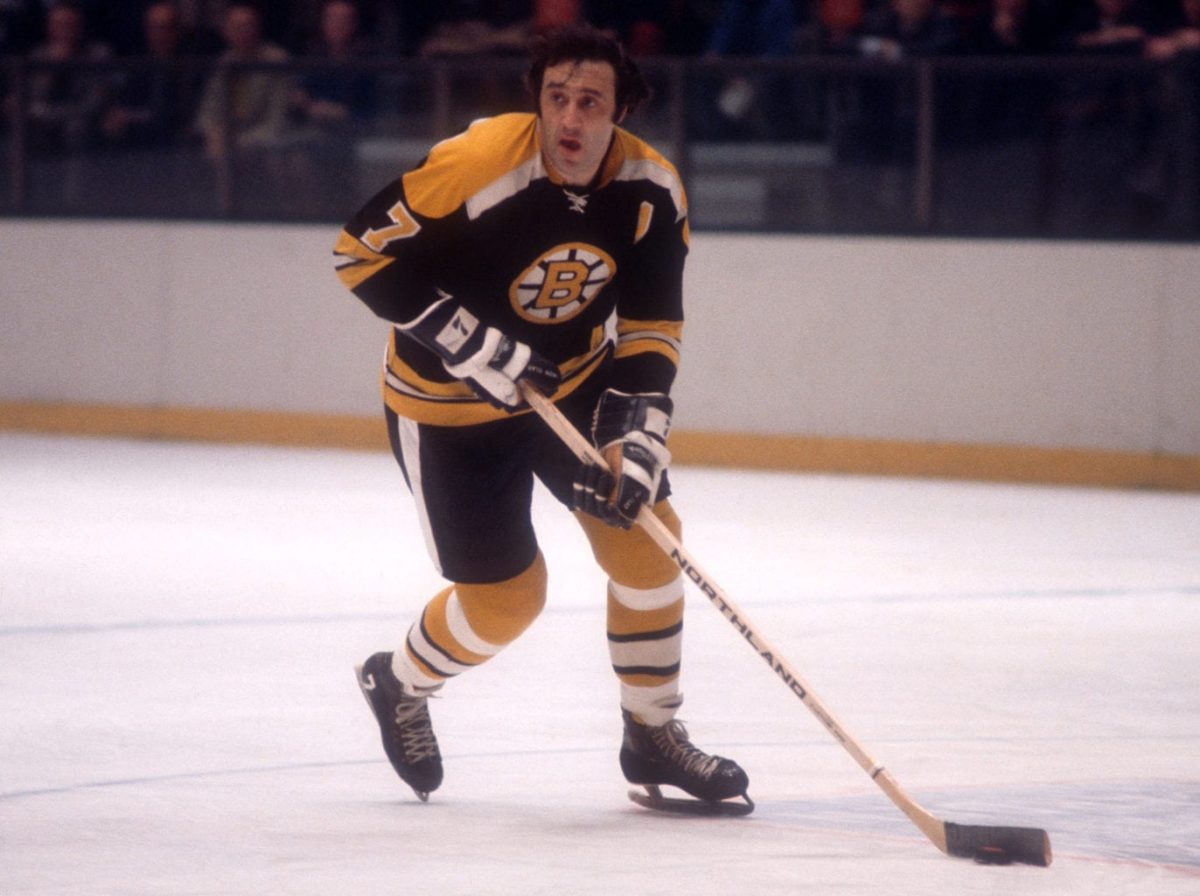
During the first five years of the 1970s, he averaged 137 points a year, winning the Art Ross Trophy from 1970 to 1974. Surprisingly, despite all those goals (332) and points (703), Esposito wasn’t even the Bruins’ top playmaker in the decade, with Bobby Orr taking the crown with 446 helpers. Considering Boston was one of the most dominant teams of all time for a short period, the group would win the Stanley Cup in 1970 and 1972, losing in the Final in 1974.
Ray Bourque – 775 Points (1980 – 1990)
Ray Bourque‘s journey to becoming the NHL’s highest-scoring defenseman of all time began in 1979-80 when he netted 65 points to capture the Calder Trophy at 19. Eventually, the five-time Norris Trophy winner would be the Bruins’ best skater in the 1980s, finishing the first decade of his career with 562 assists and 775 points. Furthermore, he finished third in goals (213) behind Keith Crowder (219) and Rick Middleton (279) despite playing in a club-leading 714 games.
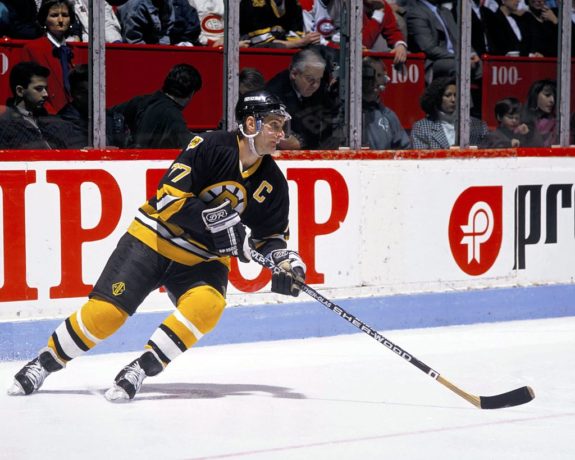
Unsurprisingly, Bourque was an All-Star all ten seasons, leading the NHL in shots on goals in 1984 and 1987, with the latter being the first year he was named the league’s best defenseman. Besides winning the Norris Trophy again in 1988 and 1990, he earned votes for the Hart Trophy seven times and was a top-four finalist for the Norris Trophy every year from 1979 to 1990.
Ray Bourque – 666 Points (1990 – 2000)
After leading the Bruins to the Stanley Cup Final in 1988 and 1990, both losses to the Edmonton Oilers, Bourque continued to captain the team into the Millennium. During the 1990s, when Boston employed Hall of Famers like Cam Neely and Adam Oates, the team couldn’t get back to the Final, but Bourque didn’t slow down offensively, scoring a decade-best 666 points thanks to a team-leading 501 assists.
Statistically, Bourque came nine goals shy of tying Neely, who had 174 in just 231 games due to several significant knee injuries. However, by the end of the 1990s, Boston would lose their 29-year playoff streak in 1996, finishing the decade out of the playoffs. Ultimately, the club would lose their best statistical player of all time, who finished his legendary career with a Stanley Cup win while skating with the Colorado Avalanche in 2001.
Joe Thornton – 346 Points (2000 – 2010)
As of 2023, former first-overall pick Joe Thornton remains the only athlete in the top four North American sports to be traded during the season they were named league MVP. After debuting as an 18-year-old in 1997, he would eventually assume the team’s captaincy in 2002, serving in the role until his trade to the San Jose Sharks in November 2005.

Despite playing only five seasons in the 2000s with Boston, he led all skaters with 346 points in 315 games, beating out former linemate Glen Murray, who had 340 points in an additional 100 games. Interestingly, this decade was the first time in nearly a century that the team had a different scorer in each category, with Murray potting the most goals (180), Marc Savard leading in assists (223), and Thornton scoring the most points.
Brad Marchand – 645 Points (2010 – 2020)
Current Bruins captain Brad Marchand became an NHL regular in 2010-11 and, during his second season, would win the Stanley Cup as a 22-year-old. As the longest-tenured player and the only one who has remained with the club since their last championship, he was statistically Boston’s best scorer in the 2010s.
Although many would associate the 2010s Bruins with future Hall of Famers Zdeno Chara and Patrice Bergeron, Marchand led all his teammates by skating in 731 games, scoring 290 goals, adding 355 assists, and collecting 645 points. Surprisingly, he has never won any NHL awards and has one 100-point season on his resume, coming in 2018-19, the last time the Bruins advanced to the Stanley Cup Final. Outside of the shortened 2012-13 season, Marchand has scored at least 20 goals every season since 2010-11.
David Pastrňák – 238 Points* (2020 – Present)
*Points calculated from 2020-21 to 2022-23
Related: Boston Bruins Must-Watch Games in 2023-24
As the highest-paid skater ($11.5 million) on the roster today, it is no surprise that David Pastrňák is the Bruins’ leading scorer this decade with 238 points. Furthermore, after scoring a career-high 61 goals in 2022-23, becoming only the second player (besides Esposito) in team history to surpass 60 in a single season, he’s also at the top in that category with 121 lamplighters.

Ultimately, it would have been a clean sweep for Pastrňák, but Marchand has more assists right now with 134. Considering the Bruins captain is on the back side of his career, and Pastrňák has eight years left on his deal, there’s a good chance when this list gets updated in 2030; he’ll be the decade’s leading scorer in all three categories. Additionally, at 301 goals, there’s a good chance that Bucyk won’t remain as Boston’s top goal-scorer for more than five more seasons.
Historical Perspective
As one of the Original Six franchises, the Bruins have had plenty of Hall of Famers don the iconic Spoked B sweater, with many legends getting their names etched on the Stanley Cup. However, most of the scoring records belong to Bourque, who skated during an era of high-scoring games and terrible save percentages, leaving several unobtainable totals in the record book.
Although Bergeron spent 19 seasons with the club, he didn’t come close to breaking any of those marks, which is a daunting task for someone like Pastrňák, who has at least another decade to go in black and gold. Even though many people will try to match or break these iconic franchise records, the best they may do is be the decade’s leading scorer, something so few have achieved while playing in Boston.
